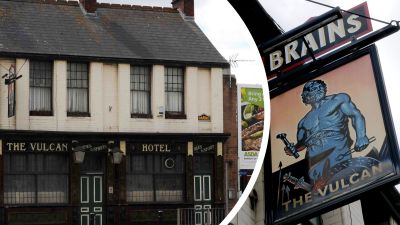A look back at the Vulcan pub and its place in the long lost Newtown community

The Vulcan Hotel was originally registered as an 'ale house' on Adam Street in 1853.
It was one of Cardiff's best loved landmarks from the 19th century and it is currently being rebuilt at St Fagans, National Museum of Wales.
The Vulcan served the mainly Irish community of the area that was then called Newtown, which was demolished in 1970.
It was one of pubs several along Adam Street - the Wheat Sheaf was a few doors down and the Forester's Arms was on the other side of the street.
The area of Newtown - home to the Vulcan - has been described as a colourful place to live, with a great sense of community.
It was also known as 'Little Ireland' because of its large Irish population.
In the 1830s the 2nd Marquess of Bute brought over Irish labourers to dig out the new dock he was building in Cardiff.
A decade later many more Irish migrants settled in South Wales to escape the potato famine back home.
In Nick Shepley’s book The Story of Cardiff, the historian said: "Cardiff is as Irish as it is Welsh".
He said it was Irish workers who helped turn Cardiff from a small fishing hamlet at the turn of the 19th Century into the coal metropolis.
He added that these Irish workers could claim much of the responsibility for making it the city it is today.
“All that’s left is a wall” Remembering Cardiff’s lost community of ‘Little Ireland’
Cardiff's 19th century Vulcan pub being rebuilt brick by brick
Mike Crocker, who is writing a book on the area, said: "When they built Newtown, Adam Street was the first street built, which is where the Vulcan was.
"It was the first suburb built outside the confines of town.
"People wanted to live in Newtown because you could get to the docks in 10 minutes. It was a largely working class area, designed for labourers to live.
"There were also a lot of Italians who came and populated the area around Adam Street.
"They opened sweet shops, cafes and ice cream parlours."
Mike lived in South Newtown, which he said was on the other side of the tracks to the Vulcan.
The Vulcan was the last surviving building from the area.
In 2011, Manic Street Preachers frontman James Dean Bradfield, nominated the Vulcan as 'the perfect pub'.
He told the Guardian: "I've had a really long relationship with the Vulcan. Weirdly, I used to get taken there as a kid on international days...
"It's a perfect example of an old-fashioned Welsh pub, beautifully basic. These places have to be preserved for future generations, they're a reflection of the times they've survived though".
He added that it is "somewhere that seems to seep history through the very walls".
During the Vulcan's long history, it saw major changes as Cardiff grew to become an industrial powerhouse and then the nation’s capital.
Previous owners of the pub include Vera and Bernard Joliffe and landlady Liz Smart. Liz left the Vulcan in 2010, after 18 years.
At the time, she was reported to say: "I believe the Vulcan, like Star Trek, will live on forever. Beam me up!"
It seems a fitting sentiment considering the pub is now being restored and will have a new home in St Fagans.
There was a campaign to save the Vulcan from demolition, which ran for four years from 2008. In 2012, when last orders were called, the campaign group issued the following statement:
"The Save the Vulcan campaign welcomes the announcement given on Friday 4th May 2012 and is very pleased that The Vulcan Hotel is to be preserved at The National History Museum at St Fagans.
"However, the group is disappointed that it will not remain in its current location as a working pub.
"We are deeply saddened and upset about the sudden and unexpected closure of the Vulcan on Friday 4th May.
"The current lease was due to expire on the 31st May 2012 and by ending the lease early it has deprived all of us of an opportunity to say our final farewells to our beloved local pub and give The Vulcan the send off it deserved.
"On a personal note, terms like "end of an era" get thrown around far too readily, but for those who ever got a chance to experience the unique energy and charisma that The Vulcan has, it rings with absolute truth."
Staff from St Fagans historic buildings team dismantled the famous Cardiff landmark in 2012, nearly 160 years after it was first registered.
The museum plans to display the Vulcan as it was in 1915 - an important year for the pub. It had just undergone a major refurbishment that saw its distinctive green tiles added to the front, as well as a redesign of its interior.
The restoration is still ongoing and the pub is being carefully rebuilt using the original stones, bricks and woodwork, all placed exactly in their original positions.
Video report by Richard Morgan